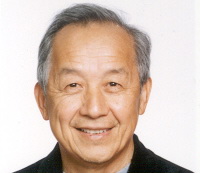Prof. William S-Y. Wang
Director, Center for Language and Human Complexity, CUHK
Academician, Academia Sinica
Professor Emeritus, University of California at Berkeley
Honorary Professor, Peking University
Best Wishes on Your Tenth Anniversary!
 The Swiss linguist, Ferdinand de Saussure, influenced 20th century linguistics in two formative ways. His brilliant work on Indo-European laryngeals, published in 1879 at the precocious age of 22, was a powerful demonstration for us that languages contain systemic patterns which merit deep study. On the other hand, his excessive emphasis on pretty patterns to the exclusion of the social and biological foundations of language, as reflected in his famous Cours de Linguistique Générale, posthumously published in 1916, gave rise to an isolationist stance which unfortunately constrained our vision of linguistics for many decades, from structuralism through generativism.
The Swiss linguist, Ferdinand de Saussure, influenced 20th century linguistics in two formative ways. His brilliant work on Indo-European laryngeals, published in 1879 at the precocious age of 22, was a powerful demonstration for us that languages contain systemic patterns which merit deep study. On the other hand, his excessive emphasis on pretty patterns to the exclusion of the social and biological foundations of language, as reflected in his famous Cours de Linguistique Générale, posthumously published in 1916, gave rise to an isolationist stance which unfortunately constrained our vision of linguistics for many decades, from structuralism through generativism.
Edward Sapir was among the few who early advocated a broader view for linguists, with these words published in LANGUAGE in 1929:
"It is peculiarly important that linguists, who are often accused, and accused justly, of failure to look beyond pretty patterns of their subject matter, should become aware of what their science may mean for the interpretation of human conduct in general."
More in the spirit of Sapir than Saussure, the Department of Linguistics and Modern Languages at CUHK was concerned with the connections between language and ‘human conduct in general’ at its very beginning. Theoretical analyses are carried on side-by-side with the effective teaching of a healthy variety of languages in the department, and more languages are being added still.
How languages are acquired, either by infants or by adults, is a fundamental puzzle in linguistics. CUHK’s contributions to the study of language acquisition are distinguished by two additional flavors not often found elsewhere. One is the acquisition of multiple languages, a topic especially important for international Hong Kong, where the situation is 兩文三語. A concrete example of CUHK’s successful contribution here at the international level is the book, The Bilingual Child, which won the highly prestigious Leonard Bloomfield Prize in 2009. The other is the acquisition of Hong Kong sign language, investigating the process via the eye rather than the ear. Examining language through two modalities can lead us to a deeper appreciation of the system that underlies both.
The department’s course to pursue a broad vision in linguistics is clearly signaled by the recent recruitment of faculty: a professor with a PhD in cognitive psychology, and a research associate professor with background in mathematics and computer science. The curriculum is thereby bolstered by courses in neuro- and psycho-linguistics, as well as method courses in experimental design. These are timely enhancements for 21st century linguistics, to help students think scientifically about language, and make their own contributions before long.
In December 2013, a new Joint Research Centre for Language and Human Complexity was formally established on this campus, with partner centers at Peking University, and at the University System of Taiwan, a truly 兩岸三地 collaboration. The department provided invaluable assistance to the Vice Chancellor’s Office in giving birth to this new center. Since there is significant overlap in the goals of the department and of the center, there is every expectation that these two units will increasingly interact with productive synergy to mutual benefit, and to the excellence of linguistics at CUHK.
The Chinese expression 得天獨厚 applies well to Hong Kong, especially to CUHK. In physical setting, its graceful landscape of harbors and green hills is the envy of any campus, particularly when the colorful azaleas are in full bloom. It is one of the most international cities in the world, rich in Chinese heritage while also heavily exposed to the influences from South and Southeast Asia as well as from Western countries. Yet another obvious advantage the SAR clearly enjoys is its prosperity; when many mega-cities are tottering near bankruptcy, Hong Kong has a strong economy, thanks to several generations of its astute and hardworking citizens.
In this connection, the French phrase noblesse oblige comes to mind. With such significant advantages to draw upon, Hong Kong has an ‘obligation’ to offer the highest level of education and produce the highest level of scholarship in every field, and linguistics, both theoretical and applied, at CUHK is no exception. The department must consider itself ‘obliged’ to play a leading role in linguistics at the international level, producing top students and generating leading edge research. The past decade has already taken the department a good distance toward this role. Now that a strong foundation has been laid, there is every reason to look forward to ever greater achievements in the years to come!
With best wishes for the many decades ahead
